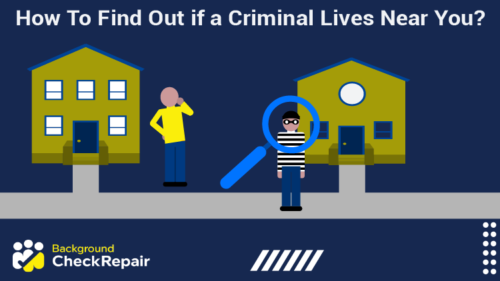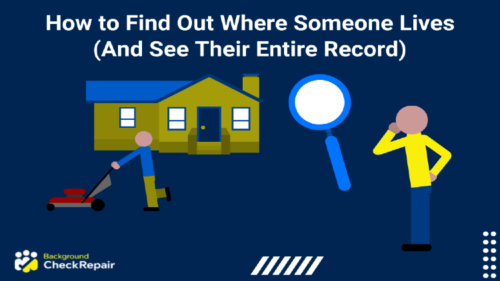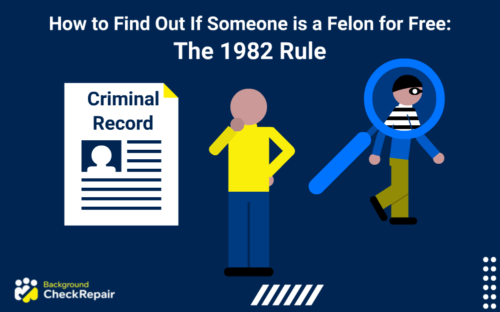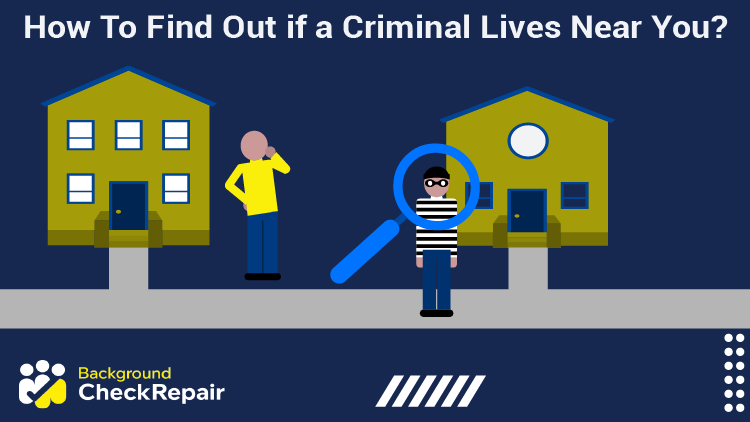
Many individuals who are considering moving to a new neighborhood might be worried about the safety of their children or even their own safety and want to know how to find out if a criminal lives near you.
This is a question many people ask, even when not relocating.
Knowing if there are criminals near your home (and their crimes) can dictate the security measures you put into place
Thanks to public information laws, there are 6 steps anyone can take to learn as much information as possible about their neighbors. In addition, there are some other tips that can be used for how to locate the current residence of an individual and who is the resident of this household and nearby residences.
To learn how to find out if a criminal lives near you, keep reading this full guide to criminal searches.
How To Find Out if a Criminal Lives Near You
Knowing some general information about who are your neighbors on your street, can help individuals get a better idea of who they live near and just how safe their neighborhood actually is.
Unfortunately, searching for this kind of information can be somewhat difficult since there is no all-inclusive database for those wondering how to find out if a criminal lives near you, with the exception of sex predator search portals (explained further below).
Although criminal convictions and even criminal charges are considered public information under the Freedom of Information Act,1 knowing how to use this information effectively to get an idea of who your neighbors are is a different story.
One of the biggest issues with this is there is no database that houses criminal conviction information geographically, besides sex offender information.2 This means that the only way for individuals to know for sure if their neighbors have ever been convicted of a crime is to perform a name-based search on them.
All of these issues and more can make it extremely difficult for individuals to confidently search for criminal history information in their neighborhood.
With all that being said, it is possible to learn a fair amount of information about your neighbors and to get a fairly good idea of who is living in your neighborhood and if they have any worrying information on their record.
How To Check Crimes in My Area Step by Step
Knowing how to check crimes in my area is a somewhat long process when performed manually, but individuals who are worried about their safety or the safety of loved ones will find the process well worth it.
It’s important to note, that when using the information for personal, there are laws that dictate how it can be used. And, this process should never be used for professional reasons.
When performing these types of criminal searches for professional reasons, federal law outlines specific conditions.
Step 1: Find Out Your Neighbor’s Names
The first thing that individuals will want to do is to figure out their neighbors’ names.
Ideally, individuals will want to simply ask the neighbor or find out through a third party as this will be by far the most reliable way to find out who is actually living in the house or the apartment.
However, this will not always be possible and individuals may need to find this information themselves using public records. One way to find names is to perform a reverse address lookup search.
Using a free service, type in the addresses located on the street and collect the names.
Step 2: Access Local Tax Records
Individuals who live in a residential neighborhood where people tend to own their homes and are wondering how to find out where someone lives can use public records to do so. However, before going straight to public records, running a quick google search of the address is always worth a shot.
Individuals might find their neighbor runs a business from their home and can find information through the website of the business or their information can even show up on websites like Whitepages. However, if the search turns up with no results, individuals will want to get in touch with their local county tax assessor.
Everyone who owns a home is required to pay property taxes for their home to the county. These property taxes are considered public records and individuals use this information to find out who is paying the property taxes at a specific residence.
Individuals will need to find their local tax assessor, which can usually be found on the city government’s website. In most counties, this information will not be available online and individuals will need to visit the office in person or contact the assessor directly with the address.
If this doesn’t yield the necessary information, individuals may need to contact the local county clerk.
If the tax assessor did not reveal information about who lives at a property, individuals should contact the local county clerk. The county clerk will be in charge of most of a county’s public records including deed records and voter registrations.
Voter registrations are public information, and many counties and states sell that information. So, accessing it might cost a fee, but with it, anyone can obtain the name and address of any registered voter.
Deed and property records are also public information so individuals can use the address to search for deed records to see if there are any records available.
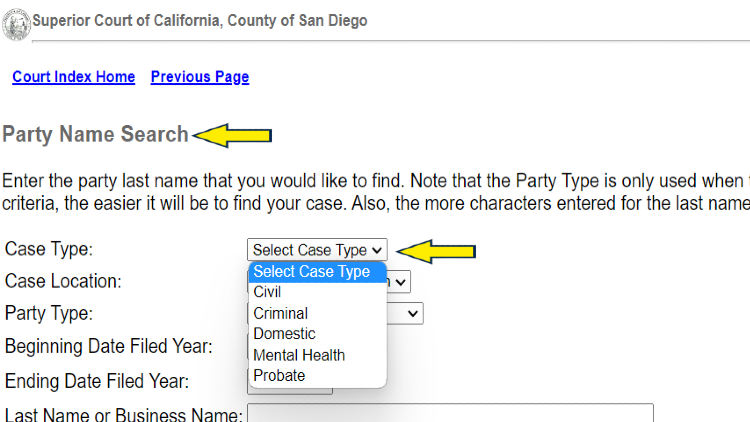
Once a person has the names of their neighbors, searching for court records using the local county search features can show any criminal records associated with that person.
As mentioned, this will only be effective for individuals who live in an area where people tend to own their homes. Once individuals have learned their neighbor’s names they can proceed to the next step.
Step 4: Access Local Court Records
Looking at public records involving who owns a property can reveal important information besides their name, such as how long the individual has lived there.
This can be a great way to determine if a local court records search will be an effective method to find out criminal history information about the individual.
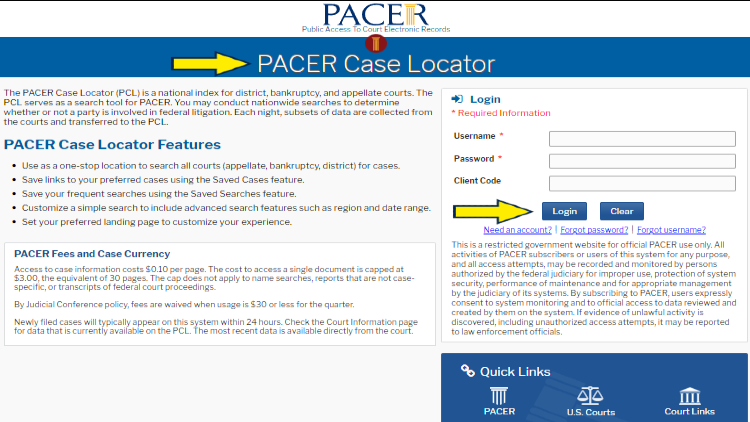
PACER is a federal court search tool that can be used to search nationwide records, but it is not free.
Individuals can go online to the website of their local criminal court to see if they have a searchable database online, which is usually the easiest method.
If there is no searchable online database, individuals can visit their local criminal court and request the records from the court clerk using the individual’s name.
Although going straight to the source and accessing official court records is the most reliable way to learn about how to go about getting a criminal background check, online background check services can be highly effective for this as well.
Individuals can use the search bar at the top of this page by typing in the name of their neighbor, or anyone they wish to search.
This will perform a public records search which should include criminal history and other public information on the individual.
The last thing that individuals should do to learn about who lives in their neighborhood is to perform a sex offender registry check.
Unlike a criminal history check, this will not require that individuals know the name of the individual, instead, the search can be performed using a geographic area.
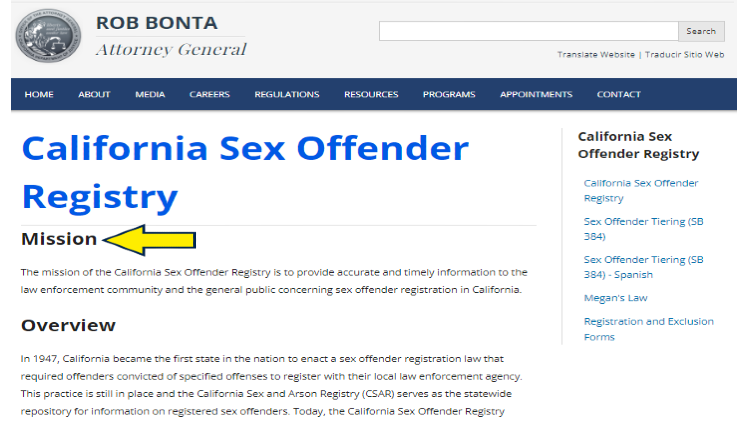
Sex offender registries, both state and federal, can show where convicted sex offenders live near you.
Individuals can check the national sex offender registry or by using a state sex offender registry such as the California sex offender registry or the Texas sex offender database.6,7
Both of these should have the same information but with the search being free and so easy to perform it is usually worth it to check both in case there are any discrepancies.
How To Find Out if Your Neighbors Are Criminals
When it comes to how to find out if your neighbors are criminals, there are a ton of obstacles that individuals will need to overcome in order to be confident in their assessment and prevent potential holes in the way they research this matter. The majority of the searches that individuals will want to perform can be broken down into two main issues: Who are my neighbors? And Have my neighbors ever been convicted of a crime?
As mentioned there is no database that can be used to simply search an entire geographic area for this information. The main reason that no such database exists is that there are simply too many variables that could affect the data and render the information incomplete and thus not a good way to determine how safe a neighborhood is.
When it comes to finding out who your neighbors are there are several issues.
For one, the only information that is publicly available that allows individuals to figure out who lives there are the tax and property records of who owns a specific house. Even if someone owns a house, it does not necessarily mean they actually reside there.
The house could be occupied by a family member or even a tenant that has no relation to the owner. In situations where the owner is the one living in the house, there will still be no public records that confirm if anyone else lives in the house such as a friend or romantic partner.
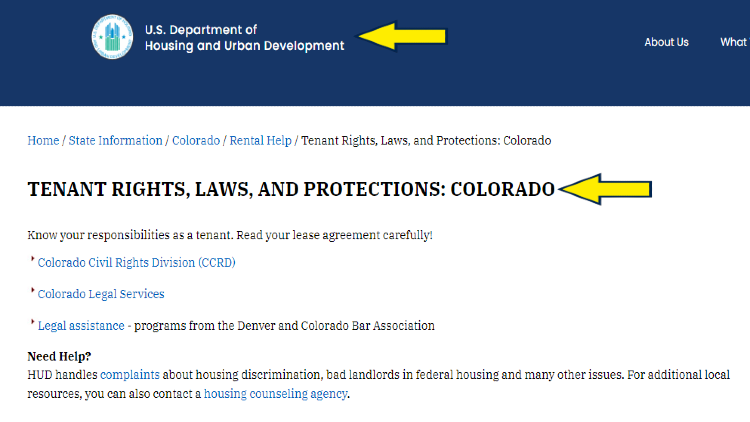
Individuals in rental units can’t be identified through public records similar to those who own their homes.
When it comes to apartments this issue is compounded as there is no database that will contain information on tenants in an apartment complex. Only the landlord will have this information which will be confidential.3
In short, there is no reliable way to figure out who lives in an apartment using public records. However, there are other tools individuals can use to get a general idea.
Websites like Nextdoor can give some insight into the residents of a specific apartment complex as well as examine various social media groups in the area, particularly those dedicated to local crime.
Aside from issues of simply finding out who lives where there are several obstacles to consider when it comes to finding out if these individuals have ever been convicted of a crime.
Individuals who are looking to see how safe their neighborhood is will likely want to know how to verify if someone has a criminal history so they can find the details of any criminal charges or convictions on their neighbor’s records. Although possible, this can be somewhat difficult.
Assuming the individual knows their neighbor’s name, it can still be difficult to use official sources to find their criminal history information without knowing every place they have ever lived.
Although many people are under the impression that there are numerous national criminal databases this is not the case. Even background check agencies, such as those that perform pre-employment background check, rely on local court records to perform their searches, which is the main reason that individuals are asked to list previous addresses on job applications.
In order for an individual to get a copy of their neighbor’s criminal records they will need to request the records from the court where the charges were filed, if the individual has lived in multiple counties, this means requesting criminal records from each individual county.
Although the fees for obtaining such records are fairly low, performing dozens of searches on your neighbors can become costly and extremely time-consuming.
Although using official records is the most reliable, it is not always the best option for individuals who don’t have a ton of information about their neighbors. For most individuals, going through a private background check service will be the best option.
Performing a private background check on someone can be done using only their name and some other basic information such as the city they live in.
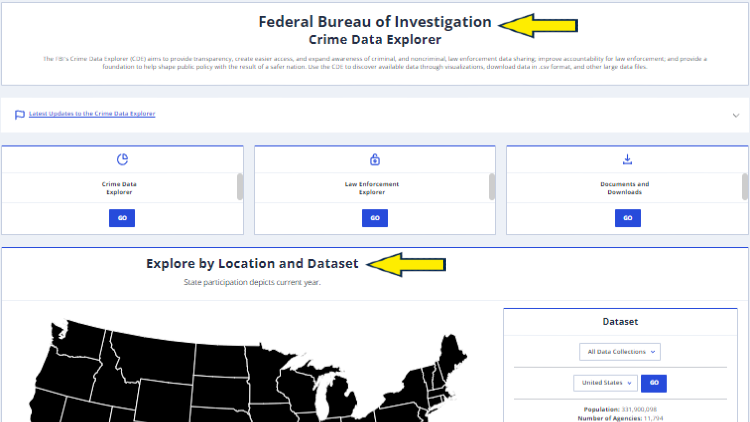
The federal government’s crime data explorer tool shows state crime statistics, but not the names of the offenders or where they live. It only shows where the crimes occurred.
The background check service will then be able to find all criminal history information and other public records that match the individual’s name.
Keep in mind when it comes to criminal history information that is obtained this way, it will likely only have the official charges that were filed against the individual, and details of the case will not be available through the private agency in most cases. However, the background check report should contain sufficient information for individuals to be able to contact the court clerk where the case was filed and request official documents so individuals can know the exact details of the case.
Of course, for more serious crimes there are likely local news stories that will discuss the details which individuals can use to find the details for free. Finally, local laws will need to be taken into consideration when looking at criminal history records.
There are tons of states that allow individuals to easily seal certain criminal records to hide them from the public, such as California’s SB 731,4 which allows individuals who were convicted of non-violent offenses and meet a few other criteria to have their records sealed.
Should this be the case, an individual searching for the records using a background check agency or looking directly at local court records will not find any evidence of the records.
It is also worth mentioning that many individuals will have heard of the seven-year rule and ten-year background investigation states. These laws expand on the FCRA,5 and limit how far back an employer background check can go when looking for conviction information.
However, this information only applies to employer background checks. Individuals running private background checks on another individual will be able to view an individual’s entire criminal history.
Below individuals will find specific steps for the most thorough and accurate search possible to answer the question of how to find out if a criminal lives near you.
How To Find Out Who Lives in Your Neighborhood
Knowing how to find out who lives in your neighborhood can be extremely useful.
As mentioned there are a number of official ways that can be used, but these days one of the most effective ways to answer the questions of, who lives here, is to use websites like Nextdoor or other local social media pages.
How To Find Out if a Crime Happened at an Address
When it comes to how to find out if a crime happened at an address, it will vary based on the city. Generally, individuals can request information about crimes from their local police department.
Most law enforcement agencies have their own social media accounts where they may post information about crimes and other similar activities.
Many law enforcement agencies have also begun using body cams, whose footage can be requested through the law enforcement agency.
Family Watchdog: How To Find Out If a Criminal Lives Near You
Family Watchdog is a popular website where individuals can learn about local crime and other safety information for their neighborhood.
Family Watchdog crime stats can be a great way to learn some general information about your neighborhood and the Family Watchdog risk level tool can also be utilized to see how safe an area is for children and other family members.
Individuals can perform a familywatchdog.us search using their address to find information about the local area. For example, individuals can perform a search of family watchdog Colorado to find information about sex offenders in the state.
Many people might be wondering what does other offense mean on Family Watchdog. Another offense is a non-sexual offense that still requires by law that the individual’s name appear in a registry.
What crimes require that the individual be entered into a registry will vary by state.
Megan’s Law Map
Megan’s law map is yet another tool individuals can use to learn about sex offenders in their neighborhoods. This tool will usually have the same information as the state and national sex offender registry but since it is free to use it’s generally worth the redundancy to be completely certain of who lives nearby.
Megan Law Search by Zip Code
Individuals can use Megan’s law search by zip code tool to learn about their city and neighborhood sex offenders. For example, individuals can limit their search to Megan’s law in Merced, CA, to learn about offenders in this area.
There is also the option to use the interactive map to perform Megan’s law California search or a search of any other state.
Megan’s Law Website
The Megan’s law website has other useful information such as Megan’s law list, which individuals can use to quickly find those that were convicted of more extreme crimes. Many people will also be wondering about the website’s namesake and Megan’s law story.
The name Megan’s law refers to an infamous case that took place in New Jersey in 1994,8 in which Megan Kanka was abducted and ultimately murdered by the family’s neighbor who was a convicted sex offender, unbeknownst to them at the time.
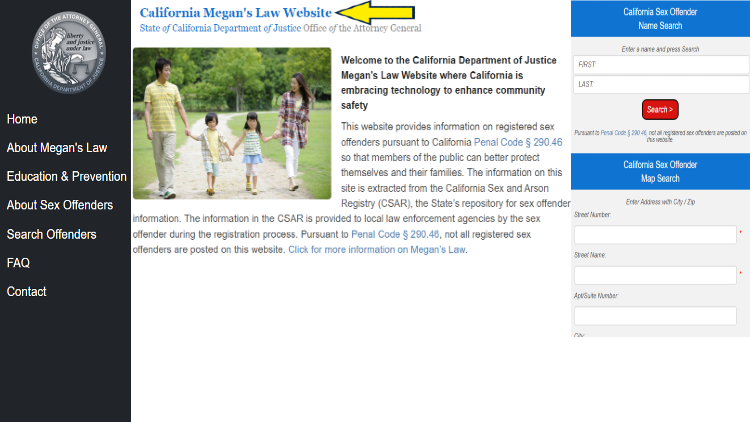
The Megan’s Law website provides detailed information about sex offenders who live near you.
The website was created to help individuals identify nearby sex offenders to prevent a similar tragedy from happening again.
Search for Felons by Zip Code
Unfortunately, there is no way to search for felons by zip code. Individuals will need to at least know the name of the individual they wish to search for in order to find any criminal history information about them.
The only exception to this is individuals who have been convicted of crimes that require them to be on a sex offender registry which can be searched by zip code, city, etc.
Registered Felons in My Area: How To Find Out if a Criminal Lives Near You
Those looking to find registered felons in my area will need to figure out the name of the individual they wish to search for, possibly by looking at tax assessor records.
Therefore, the best thing people can do is to perform a background check on the individual using a private service. This will reveal the individual’s criminal history, regardless of where they have lived previously, as long as it was in the United States.
Moving to a new neighborhood can be an extremely exciting time, especially for families with children.
However, not knowing how safe a neighborhood is is not a good place to be in and individuals should familiarize themselves with possible steps they can take to answer questions like how to find out if a criminal lives near you, and questions about local sex offenders.
Frequently Asked Questions About How To Find Out if a Criminal Lives Near You









